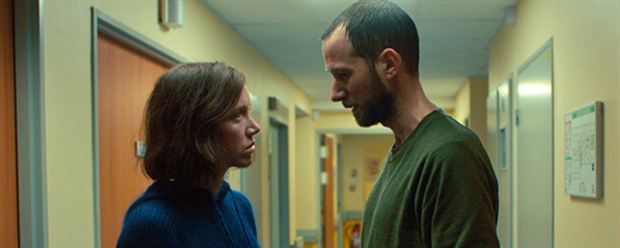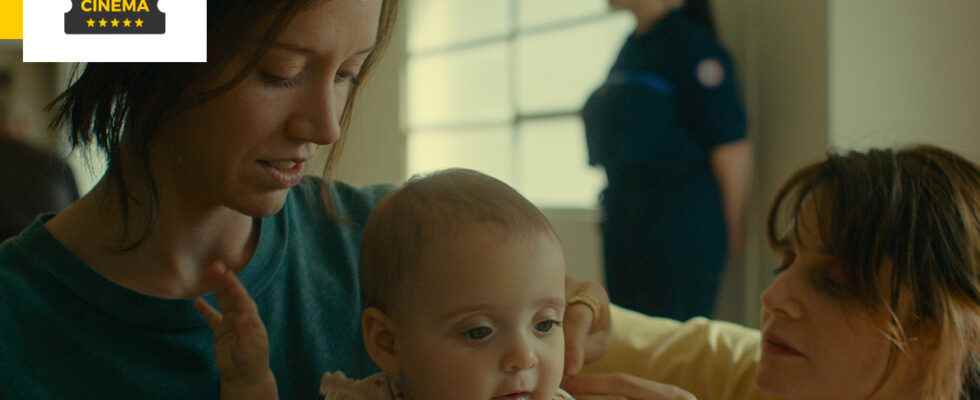After seducing the festival-goers of Angoulême and Valenciennes, Le Sixième enfant arrives in your rooms. Focus on this panting love film alongside those who talk about it best: actor Benjamin Lavernhe and his director Léopold Legrand.
It was presented out of competition at the Festival 2 Cinéma de Valenciennes, which was held from September 23 to 28, and was unanimously acclaimed there. Before that, he had won all the prizes in Angoulême, including the Valois for Best Actress, awarded ex aequo to the overwhelming Judith Chemla and Sara Giraudeau. It is released in theaters this week and will, we hope, continue its fine run.
The Sixth Child is the first feature film by Léopold Legrand, a promising director who knew how to perfectly stage the desire for motherhood at all costs, against all odds. And choose to embody this love story in the form of a thriller, four sizes of French cinema that we still do not see enough: the aforementioned duo of women Judith Chemla / Sara Giraudeau, as frail as they are strong and determined; and the male duo Damien Bonnard / Benjamin Lavernhe, sometimes proactive, sometimes disconcerted. It is the latter that we met at the Festival 2 Cinéma de Valenciennes, delighted to defend his film alongside his director and mentor, also present. Meet.
Leopold Legrand. Note this surname which is not usurped. After studying literature and training at INSAS, a public film school in Brussels, he produced two very fine short films: a documentary about a child in public assistance in Poland named Angelica. And an adaptation of a chronicle telling “the confinement of society, the security withdrawal where we put codes at all our doors, which prevents us from providing help”entitled Death to codes. Until the Sixth child, on which he looked into in 2018 and which is released in theaters this Wednesday.
The story is that of Franck, scrap dealer, and Meriem. They have five children, a sixth on the way, and serious financial problems. Julien and Anna are lawyers and can’t have children. Their meeting is that of an unthinkable arrangement.
I grew up with this idea of two moms
“The starting point of my film is the novel ofAlain Jaspard, crying rivers. When I discovered it, I was very touched by the trajectory of these two women around this child. I lost my mother at the age of 6 and was then adopted by a woman under the law. So I grew up with this idea of two moms”told us the filmmaker.
“I was also jostled by the pitch of the novel, this traffic, this exchange of a child for a truck. And as the pages turned, my judgment deteriorated. I felt like to take a deep look at his characters, beyond prejudices.”
Bet won. When we see his edifying film, questioning morality, it is quickly complicated to pass judgment. Story of love or transgression, of couples or of friendship, of madness or of desire, our landmarks are abused.
“Before being a transgressive story, it is indeed a love story. There is a lot of love on both sides. On the one hand, this family who lives for its five children, to support them. And on the other, this couple who have gone through a lot of hardships together and have come to a breaking point. Then comes this meeting that will unravel things. The couples will also move as they go: it starts with these two families, then these two women, and these two men.“
Two men who initiate this story and its arrangement, but who, very quickly, “because they don’t experience things in a carnal way are going to be distraught and have remorse and doubts.” While remaining “there” despite everything.
A love story in the form of a thriller
“The two distresses of these women spoke to me a lot. Desire beyond reason, and also the wrenching of a woman who is carrying a child and her marked belief that he will be happier away from her. The meeting of these distresses, I wanted to tell them like a thriller. I believe that the panting side of the film feeds the whole very strongly, the fact of leaving a lot of things in the off-screen or the ellipse. This feeds the closeness that the we have with them.”
A closeness that we immediately feel for these heroes and their disturbing project and which works on our certainties, questions them, disturbs them. What will happen to them, will they go all the way, will everything end well for them? Constructed like a social thriller, the film embraces the mental journey of the heroes, their urgency, their unspoken, all in the service of a tension within the story which makes the spectator active in his work of empathy.
Distribution Pyramid
Between each couple in the film, there are also dreams and then doubts, deep disagreements, as we have said, but also a lot of love and intimacy that do not need a dedicated scene -in bed in particular- to impose.
“There was a love scene between Anna (Sara Giraudeau) and Julien (Benjamin Lavernhe) from the start of the novel but I chose not to stage it“, specified Léopold Legrand, wishing not to penetrate more the intimacy of this couple, of this woman especially who has already suffered so much medically, when she wanted to procreate precisely.
A quartet of actors very quickly (re)united
True intimacy, however, is indeed there, led by this quartet of actors in tune that Léopold Legrand had always admired, whom he brought together very quickly, with whom he exchanged a lot, all being more interested in the history, the identity of their characters, than by the individual way of playing them. Staying up to their problems, understanding them, loving them, has thus, he says, always been the red thread of the filming, the choices of staging and the exchanges.
“For Meriem and Franck, the characters played by Judith and Damien, it was a bit special because as they were going to play people from the traveler community, there was a lot of work. Damien had this face that I wanted to be marked by life outdoors, Judith, it was more a work of composition and I knew her ability to do real documentary work upstream and to try to tell things without pathos or misery.”
“Benjamin and Sara, it was the desire to work with a young couple to evacuate the question of the age limit. I wanted to put everything in place so that the question of desire is as strong as possible. I wanted tell the story of a woman who has a desire so visceral that she will go beyond reason, and not because she has reached the age limit. In the novel, she was a children’s book illustrator . I wanted her to be a lawyer, because she is aware of the law and what she is going to break.”
One of the most beautiful roles of [sa] career
Alongside this poignant, slender and determined heroine embodied by Sara Giraudeau, Benjamin Lavernhe stands out, impressive with controlled doubt and anger: “This young hero, I fell in love with him very quickly. I identified with him very quickly, his obstacle course to adopt, this man who deeply loves his wife and sees her get carried away in a kind of madness, something of unreasonable.
The fact that he is also a lawyer, guarantor of the law, put to the test, it’s great. I liked this guy and the storm the script threw him into. His love is tested but he remains no matter what.” the actor told us, happy with his film, which he rightly thinks is “one of the most beautiful roles of [sa] career.” “I’m glad he brought me there. I had the impression of being restrained at the beginning because of being retained but no. I liked where he put me, I liked how he directed me.”

Distribution Pyramid
Known to the general public for his comedy roles (Le sens de la fête, My unknown in mind) and his ability to arouse laughter in the blink of an eye even in situations that are not funny, Lavernhe offers effect here a more reserved partition.
“The general public knows Benjamin for his roles in comedies, but he is an abundant actor, who is full of ideas, always brings something extra and often leads to laughter, plays down the drama. A humor that is either cynical or offbeat, very touching, very funny.
But on film, his potential to be a man who internalizes a lot appealed to me. I wanted it to be on the bone, rough. It was a lot of work to put nothing more, without mimicry, just as close and simple as possible to the things that are being said. On the film he always said “Ah you are bribing me, I can’t do anything”. We laughed about it because we both had great confidence. It’s not a counter-use, but a place where we know him less”, says Leopold Legrand.
In order to better understand the nuances of his character, the actor asked many questions throughout the creative process: “Léopold was a partner, passionate, happy to answer me. He was open but knew what he wanted. He managed to win the day, to convince. I love it when I feel like I’m part of the creation. I’m not just a performer. I put my grain of salt. I’m confident, I allow myself. It’s also a way to test the limits.”
The limits of a director who has none when it comes to putting ours to the test by placing us as close as possible to this hero; of his doubts and his wanderings of judgment, he too a spectator, both taken aback and involved, reasonable but in love, eager to understand.
The destabilizing, impactful and moving Sixième enfant is playing in your cinemas today.
